How To Stay Productive: The Top Time Management Books (still relevant in 2023)

We all have the same amount of time, a valuable resource, but many people find it challenging to manage effectively. With the increasing demands of modern life, juggling work, family, personal pursuits, and other responsibilities, it’s easy to feel overwhelmed and stretched thin.
Effective time management is the solution to this, and it is no just for straight a students. It’s the art and science of using our time efficiently and effectively to achieve our goals, maximize productivity, and lead a more balanced and fulfilling life.
Time management books have been a popular resource for people who want to learn how to effectively use their time. The books provide guidance on how to enhance productivity, overcome procrastination, and cultivate positive work habits. From classic time management methods to contemporary approaches, a wealth of literature is available on this topic.

This article will discuss popular time management books recommended by experts. These books provide practical tips and advice on managing time efficiently, increasing productivity, and achieving goals. Written by renowned authors in the field of productivity and time management, readers can learn valuable insights and strategies.
There are various time management books available to help you enhance your time management skills and increase productivity, regardless of your background or objectives. By utilizing effective techniques and tools, you can manage your time efficiently and achieve your maximum potential. Let’s explore some of the top time management books and authors to help you succeed.
Pro tip: There are millions of books, thousands of good ones and hundreds of ‘must read’. It is almost impossible to read all of them, use a book summary app like Blinkist to get an summary before choosing the right one for you.
The Top Time Management Books: The timeless ones
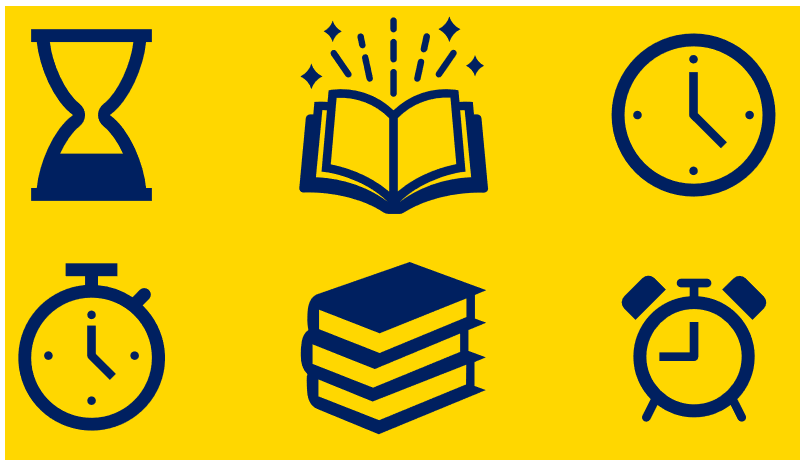
There are several books on time management that offer valuable insights, practical strategies, and actionable tips to help individuals optimize their use of time and enhance their productivity.
These books are written by authors with diverse perspectives and experiences, and have garnered widespread acclaim for their effectiveness in helping individuals manage their time more efficiently.
We will have look at some of the most popular and highly regarded time management books:
“The 7 Habits of Highly Effective People” by Stephen R. Covey

Covey’s book is a well-known reference in the area of time management. It emphasizes seven core habits that people can develop to enhance their personal and professional effectiveness and efficiency. The habits include principles such as being proactive, beginning with the end in mind, and prioritizing tasks based on importance rather than urgency.
Covey emphasizes the importance of aligning one’s actions with core values and principles, and provides a to do list of practical strategies for managing time effectively while maintaining a balanced approach to life.
“Getting Things Done: The Art of Stress-Free Productivity” by David Allen

Allen’s book is a comprehensive guide to managing tasks and projects in a systematic and organized manner. He introduces the “GTD” (Getting Things Done) methodology, which focuses on capturing, clarifying, organizing, and reviewing tasks and commitments.
Allen emphasizes the importance of clearing one’s mind from mental clutter and creating a trusted system to capture and manage tasks, which allows for increased focus and productivity. The book provides practical tips and techniques for managing workflow, handling interruptions, and achieving stress-free productivity.
“Deep Work: Rules for Focused Success in a Distracted World” by Cal Newport
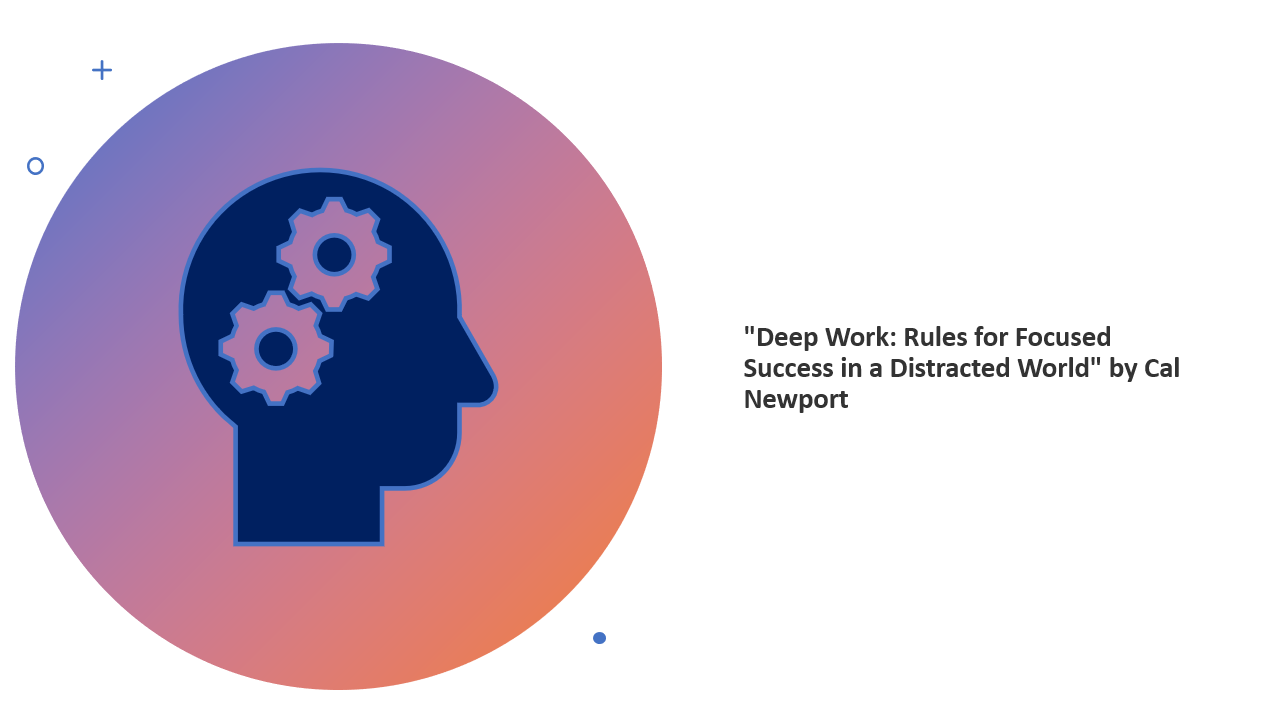
In this book, Newport argues that the ability to engage in deep, focused work without distraction is a key factor in achieving high levels of productivity and success. He presents practical strategies for minimizing distractions, managing time effectively, and creating an environment conducive to deep work.
The author emphasizes the importance of cultivating the ability to concentrate on complex tasks for extended periods of time, and provides actionable advice on improving one’s ability to focus in today’s increasingly distracted world.
“Eat That Frog!: 21 Great Ways to Stop Procrastinating and Get More Done in Less Time” by Brian Tracy

Tracy’s book offers practical tips and techniques for overcoming procrastination and improving time management skills. The book’s title is derived from the famous quote by Mark Twain, “If it’s your job to eat a frog, it’s best to do it first thing in the morning.”
Tracy advocates for tackling the most challenging and important tasks early in the day to save time and maximize productivity. He provides a range of strategies for setting goals, prioritizing tasks, and managing time effectively, along with practical techniques for overcoming common time-wasting habits.
“The Power of Habit: Why We Do What We Do in Life and Business” by Charles Duhigg

While not solely focused on time management, Duhigg’s book explores the power of habits in shaping our behavior and provides insights on how to harness the power of habits to improve productivity and manage time more effectively. He explains how habits are formed, how they influence our actions, and how they can be modified or replaced to achieve desired outcomes.
Duhigg’s book offers practical strategies for identifying and changing unproductive habits that may be hindering effective time management.
“Atomic Habits: An Easy & Proven Way to Build Good Habits & Break Bad Ones” by James Clear

Clear’s book focuses on the power of habits in shaping our behavior and offers practical strategies for building positive habits and breaking negative ones. He presents a framework for understanding the science of habit formation and provides actionable advice on how to create lasting behavior change.
While not solely focused on time management, Clear’s book offers valuable insights into how habits can impact our use of time and provides practical tips for building effective time management habits that can lead to improved productivity.
“The Pomodoro Technique: The Acclaimed Time-Management System That Has Transformed How We Work” by Francesco Cirillo
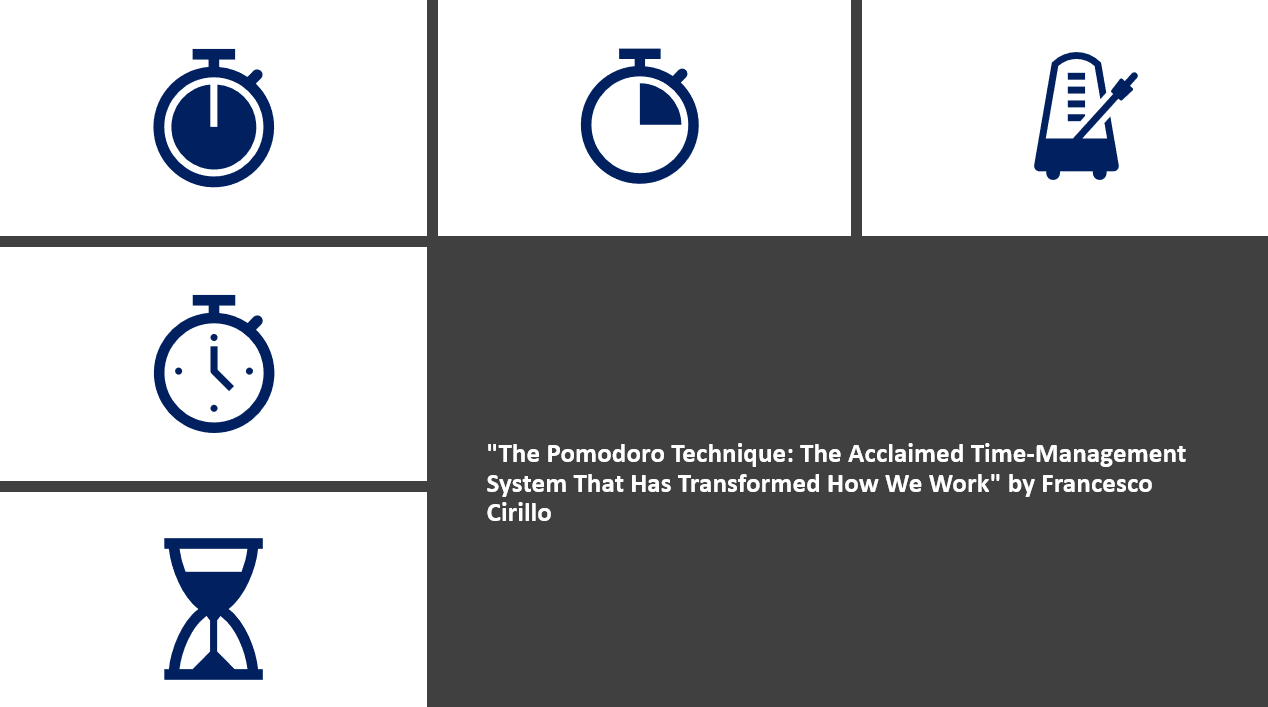
Cirillo’s book introduces the Pomodoro Technique, a time management method that involves working in focused bursts of time, typically 25 minutes, followed by short breaks. He explains how this technique can help individuals improve their focus, productivity, and time management skills.
Cirillo provides practical guidance on implementing the Pomodoro Technique, including how to plan and track work sessions, manage interruptions, and use breaks effectively.
“The ONE Thing: The Surprisingly Simple Truth Behind Extraordinary Results” by Gary Keller and Jay Papasan
Keller and Papasan’s book encourages readers to focus on the most important task or goal at any given moment and to eliminate distractions and unnecessary tasks that can hinder productivity. They emphasize the importance of prioritization, time blocking, and single-tasking as key strategies for effective time management.
The book provides practical advice on identifying and prioritizing the “one thing” that will most impact achieving desired results and how to structure daily routines and habits to support this focus.
“168 Hours: You Have More Time Than You Think” by Laura Vanderkam
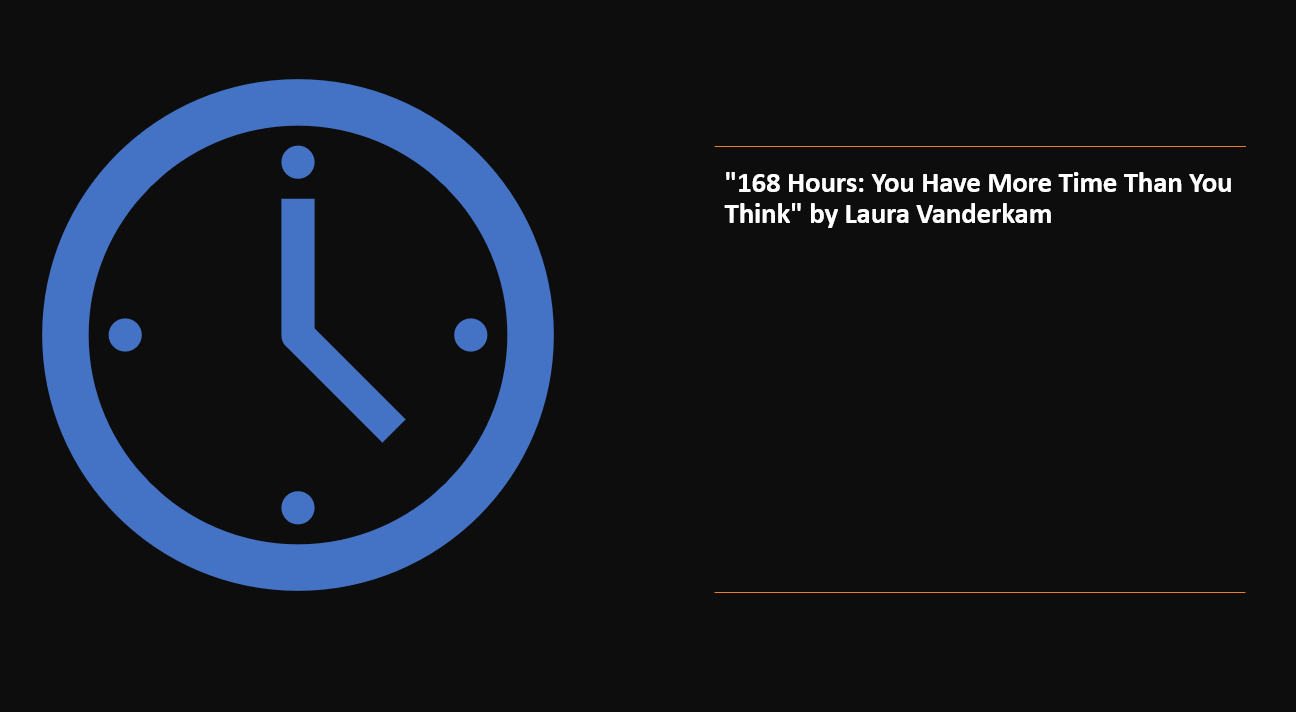
Vanderkam’s book challenges the common belief that we are constantly “busy” and have no time to spare. She argues that everyone has the same amount of time available to them – 168 hours in a week – and how we choose to prioritize, spend time, and use that time makes the difference.
Vanderkam provides practical strategies for analyzing and optimizing how we spend our time, including techniques such as time tracking, time mapping, and time budgeting. The book encourages and teaches readers how to reflect on their values, goals, and priorities, and make intentional choices about how to allocate their time to align with their desired outcomes.
“The Now Habit: A Strategic Program for Overcoming Procrastination and Enjoying Guilt-Free Play” by Neil Fiore
Fiore’s book addresses the issue of procrastination, a common challenge in effective time management. He presents a strategic program for overcoming procrastination and increasing productivity, focusing on changing mindset, overcoming self-sabotaging beliefs, your own habits and developing healthy work habits.
Fiore offers practical techniques for overcoming the procrastination habit, including strategies for time planning, priority setting, and stress management.
Common Themes in Time Management Books

While time management books may vary in their specific strategies and techniques, there are several common themes that are often emphasized across many of these books:
Prioritization
Effective time management requires prioritizing tasks and activities based on their importance and alignment with one’s goals and values. Many time management books stress the importance of setting clear priorities and focusing on high-impact tasks to maximize productivity.
Focus and concentration
Maintaining focus and concentration is crucial for managing time effectively. Time management books often provide strategies for minimizing distractions, improving concentration, and staying focused on tasks.
Planning and organization
Effective planning and organization are key components of successful time management. Time management books often offer practical techniques for setting goals, creating plans, and organizing tasks and activities in a systematic manner.
Habit formation
Many time management books recognize the role of habits in shaping our behavior and emphasize the importance of building positive habits that support effective time management, such as setting routines, creating rituals, and eliminating unproductive habits.
Time tracking and analysis
Understanding how we currently use our free time is important in managing it more effectively. Time management books
Are these the most recent books?
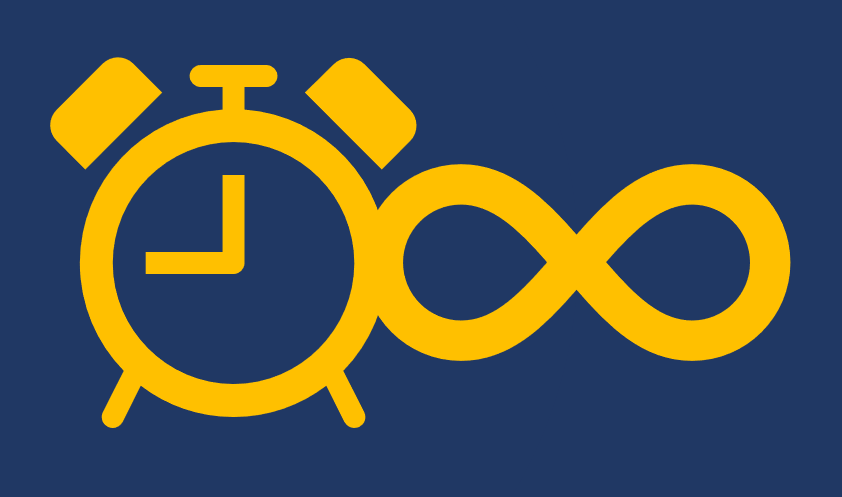
No, these are timeless books, some of which have stood the test of time and might continue to. To find the latest time management books, it’s a good idea to check trusted bookstores or review websites for recently published books in that category.
Additionally, checking for reviews and ratings from readers can also provide valuable insights into the effectiveness and relevance of a particular time management book.
It’s worth noting that the popularity and effectiveness of time management books can vary depending on individual preferences, needs, and learning styles. Amongst all the books out there, it’s important to find a time management book that resonates with your specific needs and preferences because what works for one person may not work for another.
In addition to books, other resources are available for time management, such as online articles, blogs, podcasts, and courses, which may provide updated and valuable insights on effective time management techniques.
Some principles are timeless, while some are challenged often by new research. Staying aware of new research and the latest developments in time management is important to effectively manage your time and learn the most effective strategies for efficient time management.
Frequently Asked Questions

What are the top time management books for stress-free productivity?
Some of the top time management books for stress-free productivity include “Getting Things Done” by David Allen, “Eat That Frog!” by Brian Tracy, and “Essentialism: The Disciplined Pursuit of Less” by Greg McKeown.
How can I improve my focus and achieve success in a distracted world?
“Deep Work” by Cal Newport and “The One Thing: The Surprisingly Simple Truth Behind Extraordinary Results” by Gary Keller and Jay Papasan offer valuable insights on staying focused and mastering difficult tasks in today’s distracted world.
What are some effective techniques for managing tasks and to-do lists?
Books like “The Checklist Manifesto” by Atul Gawande and “Organize Tomorrow Today” by Jason Selk and Tom Bartow provide guidance on creating and managing to-do lists for improved productivity and time management.
How do successful people optimize their performance and self-discipline?
“The Seven Habits of Highly Effective People” by Stephen Covey and “The Power of Habit” by Charles Duhigg offer powerful lessons on personal change, self-discipline, and the habits of successful people.
What are some strategies to stop procrastinating and overcome bad habits?
Books like “The Procrastination Equation” by Piers Steel and “The Now Habit” by Neil Fiore provide a step by step guide part-by-step guides for overcoming procrastination and taking control of your own life.
How can I learn from the productivity habits and experiences of others?
“The Productivity Project” by Chris Bailey and “How to Become a Straight-A Student” by Cal Newport contain inspiring stories, productivity experiments, and practical advice from people who have successfully managed their time and tasks.
What are the key principles of stress-free productivity, as taught by David Allen?
In “Getting Things Done,” David Allen introduces the art of stress-free productivity, focusing on capturing, clarifying, organizing, reflecting, and engaging with tasks to effectively manage your time and workload.
How can I improve my work efficiency and produce high-quality work in less time?
Books such as “The 4-Hour Workweek” by Timothy Ferriss and “The 80/20 Principle” by Richard Koch offer strategies for working smarter, not harder, and for time spent on focusing on the most important tasks for maximum results.
What are some books that teach rules for focused success in a chaotic world?
“Deep Work: Rules for Focused Success in a Distracted World” by Cal Newport and “Essentialism: The Disciplined Pursuit of Less” by Greg McKeown provide guidance on how to stay focused and achieve success in a world full of distractions.
Are there any resources for understanding the science behind productivity and time management?
“The One Thing” by Gary Keller and Jay Papasan and “Atomic Habits” by James Clear offer scientific secrets and principles for creating new habits, breaking bad ones, and optimizing personal productivity.
If you are into productivity apps , you might be interested in AI writers like CopyAI, Peppertype, Quillbot or Writecream. Read more here. I also write at Medium.





